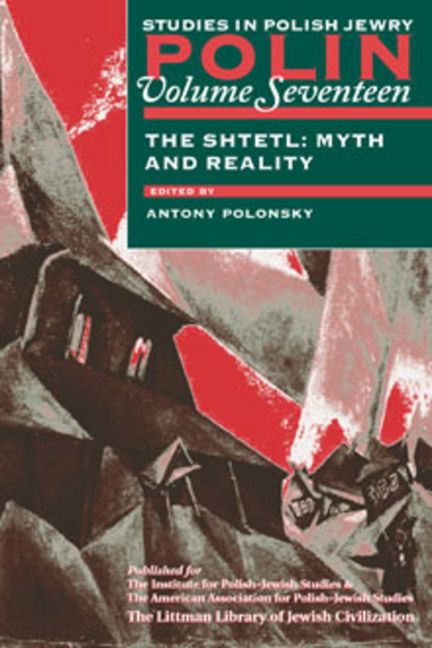Book contents
- Frontmatter
- Dedication
- Editors and Advisers
- Preface
- Polin
- Polin: Studies inPolish Jewry
- Contents
- Note on Place Names
- Note on Transliteration
- List of Abbreviations
- PART I THE SHTETL: MYTH AND REALITY
- Introduction. The Shtetl: Myth and Reality
- The Shtetl as an Arena for Polish–Jewish Integration in the Eighteenth Century
- Inter-Religious Contacts in the Shtetl: Proposals for Future Research
- The Hasidic Conquest of Small-Town Central Poland, 1754–1818
- The Drama of Berdichev: Levi Yitshak and his Town
- Polish Shtetls under Russian Rule, 1772–1914
- How Jewish Was the Shtetl?
- The Changing Shtetl in the Kingdom of Poland during the First World War
- The Shtetl: Cultural Evolution in Small Jewish Towns
- Small Towns in Inter-War Poland
- Jewish Patrons and Polish Clients: Patronage in a Small Galician Town
- Maintaining Borders, Crossing Borders: Social Relationships in the Shtetl
- The Soviet Shtetl in the 1920s
- Shtetl and Shtot in Yiddish Haskalah Drama
- Kazimierz on the Vistula: Polish Literary Portrayals of the Shtetl
- Imagining the Image: Interpretations of the Shtetl in Yiddish Literary Criticism
- Shtetl Codes: Fantasy in the Fiction of Asch, Schulz, and I. B. Singer
- Returning to the Shtetl: Differing Perceptions
- PART II NEW VIEWS
- PART III DOCUMENTS
- PART IV THE SIXTY-FIFTH ANNIVERSARY OF EVENTS IN PRZYTYK: A DEBATE
- PART V REVIEWS
- OBITUARIES
- Notes on the Contributors
- Glossary
- Index
Introduction. The Shtetl: Myth and Reality
from PART I - THE SHTETL: MYTH AND REALITY
- Frontmatter
- Dedication
- Editors and Advisers
- Preface
- Polin
- Polin: Studies inPolish Jewry
- Contents
- Note on Place Names
- Note on Transliteration
- List of Abbreviations
- PART I THE SHTETL: MYTH AND REALITY
- Introduction. The Shtetl: Myth and Reality
- The Shtetl as an Arena for Polish–Jewish Integration in the Eighteenth Century
- Inter-Religious Contacts in the Shtetl: Proposals for Future Research
- The Hasidic Conquest of Small-Town Central Poland, 1754–1818
- The Drama of Berdichev: Levi Yitshak and his Town
- Polish Shtetls under Russian Rule, 1772–1914
- How Jewish Was the Shtetl?
- The Changing Shtetl in the Kingdom of Poland during the First World War
- The Shtetl: Cultural Evolution in Small Jewish Towns
- Small Towns in Inter-War Poland
- Jewish Patrons and Polish Clients: Patronage in a Small Galician Town
- Maintaining Borders, Crossing Borders: Social Relationships in the Shtetl
- The Soviet Shtetl in the 1920s
- Shtetl and Shtot in Yiddish Haskalah Drama
- Kazimierz on the Vistula: Polish Literary Portrayals of the Shtetl
- Imagining the Image: Interpretations of the Shtetl in Yiddish Literary Criticism
- Shtetl Codes: Fantasy in the Fiction of Asch, Schulz, and I. B. Singer
- Returning to the Shtetl: Differing Perceptions
- PART II NEW VIEWS
- PART III DOCUMENTS
- PART IV THE SIXTY-FIFTH ANNIVERSARY OF EVENTS IN PRZYTYK: A DEBATE
- PART V REVIEWS
- OBITUARIES
- Notes on the Contributors
- Glossary
- Index
Summary
IT is not difficult to find descriptions of the mythical shtetl. One of the most characteristic is that of Abraham Joshua Heschel, scion of a great hasidic family who emigrated from Poland, first to Germany and then to the United States, and became one of the leading theologians of American Judaism. In his lament for the lost world of east European Jewry The Earth is the Lord's, published in 1946, he wrote:
Korets, Karlin, Bratslav, Lubavich, Ger, Lublin—hundreds of little towns were like holy books. Each place was a pattern, a way of Jewishness … The little Jewish communities in Eastern Europe were like sacred texts opened before the eyes of God, so close were the houses of worship to Mount Sinai. In the humble wooden synagogues, looking as if they were deliberately closing themselves off from the world, the Jews purified the souls that God had given them and perfected their likeness to God … Even plain men were like artists who knew how to fill weekday hours with mystic beauty.
His sentiments were echoed, although with a characteristic twist, by the Polish Jewish poet Antoni Słonimski, also the product of a distinguished Jewish lineage, who, in spite of his baptism as an infant, always considered himself a ‘Jew of antisemitic antecedents’. In his ‘Elegia miasteczek żydowskich’ (‘Elegy for the Shtetls’, 1947), he wrote:
No more will you find in Poland Jewish shtetls
Hrubieszów, Karczew, Brody, Falenica
In vain will you seek in the windows lighted candles
And search for the sound of chants from the wooden synagogue.
The last scourings, the Jewish rags have vanished
They sprinkled sand over the blood, swept away the footprints
And whitewashed the walls with bluish lime
As after a plague or a great day of fasting.
One moon shines here, cool, pale, alien,
Outside the town, when the night lights up,
My Jewish kinsmen, with their poetic fancies,
Will find no more Chagall's two golden moons.
They have flown away frightened by the grim silence.
No more will you find those towns,
Where the cobbler was a poet,
The watchmaker a philosopher, the barber a troubadour.
- Type
- Chapter
- Information
- The Shtetl: Myth and Reality , pp. 3 - 24Publisher: Liverpool University PressPrint publication year: 2004



